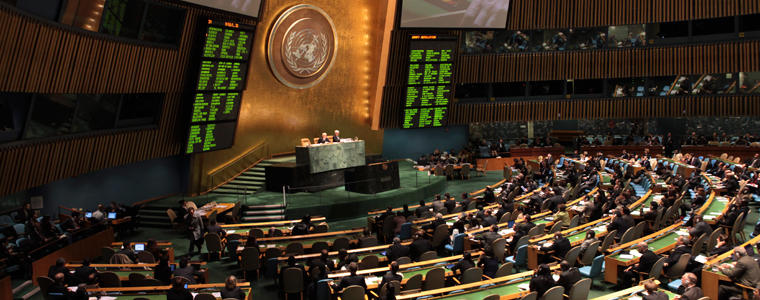The Arab League this month called for the U.N. Security Council to approve a joint Arab-U.N. peacekeeping mission in Syria, where more than 5,400 people have died as the regime of Bashar al-Assad presses a brutal military crackdown on a popular uprising in Homs and other cities. Russia and China vetoed an earlier Security Council resolution on Syria, and it is not clear how seriously the recent Arab League proposal will be considered. The Arab League has scrapped its monitoring mission in Syria amid the intensifying violence.

The Arab League this month called for the U.N. Security Council to approve a joint Arab-U.N. peacekeeping mission in Syria, where more than 5,400 people have died as the regime of Bashar al-Assad presses a brutal military crackdown on a popular uprising in Homs and other cities. Russia and China vetoed an earlier Security Council resolution on Syria, and it is not clear how seriously the recent Arab League proposal will be considered. The Arab League has scrapped its monitoring mission in Syria amid the intensifying violence.
In Sudan, rebels in the restive Darfur area this week detained and later released 52 peacekeepers in a joint U.N.-African Union force. That force deploys some 8,000 troops, 5,000 police and thousands of civilians. An ambush against peacekeepers in Darfur last month left one Nigerian peacekeeper dead and three wounded. Meanwhile, in newly independent South Sudan, ethnic clashes near the town of Pibor last month are believed to have killed at least 150 local people, most of them women and children, despite the presence of several hundred U.N. peacekeepers in the town.
Amid such growing demands for international peacekeeping missions, the U.S. Institute of Peace (USIP) will host Andrew Shapiro, the assistant secretary of state for political-military affairs, on February 27 for an address on global peacekeeping challenges and U.S. support for expanding peacekeeping capacity.
As the nation’s nonpartisan conflict management center, the Institute itself supports peacekeeping operations through its on-the-ground programs and the training of key people in local populations in Afghanistan, Sudan, Iraq and elsewhere on approaches to resolving conflicts before they become deadly. In Nigeria, for example, USIP specialists have been training African peacekeepers slated for Darfur on negotiation and mediation—skills that directly strengthen their ability to handle some of the tense situations they are likely to encounter in conflict zones. USIP has also worked to strengthen the U.N.’s peacekeeping presence in Haiti, where a force of 11,000 has been in place.
In all, the U.N. is currently leading 16 peacekeeping operations with about 121,000 military, police and civilian personnel. Its annual budget is about $7.8 billion, with the United States covering 27 percent of those costs.
Shapiro’s speech comes as the demands for United Nations peacekeeping missions are on the rise. He is expected to discuss the Obama administration’s strategy for making ongoing operations more effective, as well as describe its thinking about how support for multilateral peacekeeping advances U.S. national security interests in a time of fiscal austerity.
“Peacekeeping is not mentioned in the U.N. Charter but it is now one of the most important, demanding and visible aspects of the organization’s conflict-management work,” said Abiodun Williams, senior vice president of USIP’s Center for Conflict Management and former director of strategic planning to U.N. Secretaries-General Kofi Annan and Ban Ki-moon.
“U.N. peacekeepers now have to implement more complex mandates in the most challenging environments in the world. It is essential that any new operations are only deployed where certain minimum conditions are in place, including a peace to keep, adequate resources to do the job and the unified engagement and support of the Security Council, especially its five permanent members.”
The Obama administration has been attempting to strengthen U.N. peacekeeping capabilities, stepping up training efforts for international peacekeeping forces and helping to revamp the system of logistical support for the operations in such countries as Cote d’Ivoire, Congo, Liberia, Lebanon, Cyprus and Kosovo.
U.S. officials say they have focused on revising peacekeeping mandates that make the goals of the missions more credible and realistic. And following a period that saw the largest increase in the number of peacekeepers and missions in U.N. history—peacekeepers doubled over eight years—the administration has noted that no new peacekeeping missions have been launched in more than two years.
“They [U.N. peacekeeping missions] have addressed some of the world’s hardest and most challenging security situations,” Esther Brimmer, the assistant secretary of state for international organization affairs, told a USIP audience on September 7, 2011. “They do all this at a fraction of the cost of sending U.S. troops, and mean that we need not choose between doing it ourselves or doing nothing.”
Explore Further
- Making Sense of the U.N. Impasse on Syria
On the Issues by Abiodun Williams